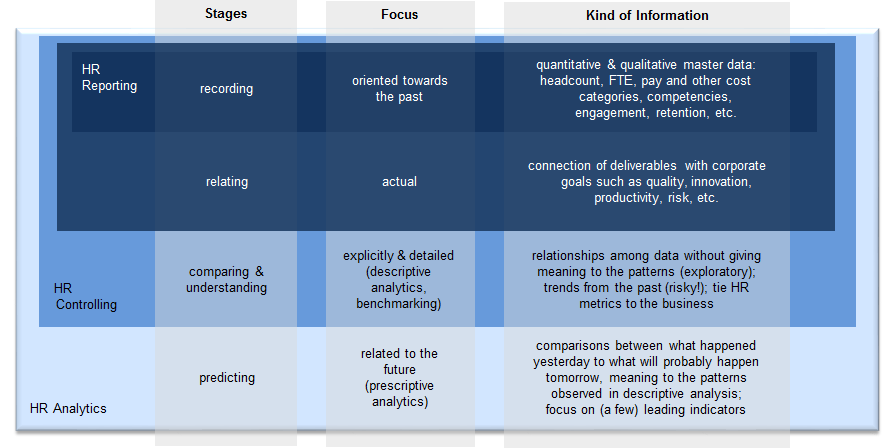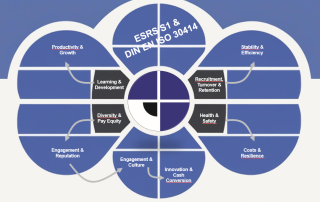Workforce Analytics contains techniques to help articulate the impact of workforce investments, as well as identify future trends that will influence both business and workforce decisions.
As the critically decisive resource for project success, planning, management and monitoring of human resources demands increased attention. Contrary to “neighboring disciplines”, in which quantitative measurement parameters are sufficient, workforce analytics requires additional qualitative parameters, such as satisfaction and commitment.
Unfortunately, in common practice however, HR management is still not yet as advanced as other business disciplines – there is a discernible inability to collect, analyze and utilize data. Managers also report a lack of trust in HR when it comes to mastering the challenges of human capital in the 21st century. Generally the following are true:
- In the quantitative area, data regarding employee numbers, capacities and costs dominate, with the costs usually also appearing in the HR plan.
- In the qualitative area, many companies are still in the early phases of development, while others have not even started venturing into these less traditional measurement parameters.
- Data and information usually pertain to the past and the future.
- External data, e.g. regarding relevant markets and customers, as well as financial data are often not included in HR management.
- Comparative numbers regarding the industry, region and companies of comparable size are scarce.
The following stages of expansion can principally be distinguished:

We are involved with companies of all sizes across several maturity levels and support them in their expansion into the predicting and strategy-implementing phase.
We thereby distinguish the following main topics:
- (Internal) customer perspective, requirements of the C-level;
- Operative HR controlling: monitoring and reporting;
- descriptive workforce analytics (low maturity levels): HR scorecards and dashboards, HR Market data/HR Benchmarks and correlations; and
- predictive and prescriptive workforce analytics (high maturity levels): causalities, HR risk management and human capital analytics.
For years STRIMgroup has been organizing high level specialized conferences and hands-on workshops in the area of workforce analytics.
STRIMservices offers individualized system support to small enterprises. Furthermore we collaborate with various partner companies, who take care of the technical aspects of the projects.
Dr. Volker Mayer
Gütschstrasse 22, Switzerland-8122 Binz
Tel.: +41 43 366 05 58
Morgenröte 8a, Germany-68305 Mannheim
Tel.: +49 621 7481 742, Fax: +49 621 7481 741
E-Mail: volker.mayer@strimgroup.org
Steering with Few HR KPIs (1)
ESG and HR reporting are often overloaded. Many KPIs are reported, but only a few actually drive decisions. […]
Quick-Check: Strategy, Sustainability & QM
Companies want to know how future-ready they are. To find answers, many turn to quick assessments. Some focus on sustainability and CSRD, while others evaluate processes and quality management. […]
Federal Minister Wildberger in interview
On the second day of the F.A.Z. conference “New Perspectives and Innovative Applications of Artificial Intelligence – Impulses for Business, Science, and Society,” one speaker was particularly anticipated: Dr. Karsten Wildberger. STRIM was represented by [...]
HR at a Turning Point – or Not?
Meeting the challenges in HR requires bold implementation steps and smart strategies – not someday, but today! […]
Modular people management product portfolio
The world of work is changing profoundly – technologically, culturally, and strategically. […]






